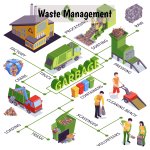Every day, we throw things away— fast food wrappers,
fast food wrappers,  packaging boxes,
packaging boxes,  plastic bottles. But have you ever wondered where it all goes?
plastic bottles. But have you ever wondered where it all goes?
In a world that’s producing over 2 billion tons of waste annually, proper waste management isn’t just an environmental necessity—it’s a global survival strategy.
Waste itself isn’t evil. It’s part of life. The real issue? How we deal with it. Landfills are overflowing, oceans are choking on plastic, and toxic emissions from incineration are polluting our air.
That’s where waste management steps in—not as a cleanup crew, but as a smart system of reducing, reusing, recycling, and recovering value from what we discard.
Waste management is more than garbage collection—it’s a cycle.  Here’s how it works:
Here’s how it works:
Besides saving the environment, smart waste management has other superpowers:
 Protects public health: Proper disposal prevents diseases and contamination.
Protects public health: Proper disposal prevents diseases and contamination.
 Makes cities cleaner and smarter: No more overflowing bins or illegal dumping.
Makes cities cleaner and smarter: No more overflowing bins or illegal dumping.
 Creates jobs: From recycling plants to eco-entrepreneurship.
Creates jobs: From recycling plants to eco-entrepreneurship.
 Generates energy: Waste can power homes through biofuel and thermal tech.
Generates energy: Waste can power homes through biofuel and thermal tech.
The message is simple: Waste isn’t worthless—it’s underused.
You don’t need to be a policymaker to make a difference.  Small steps can lead to big impact:
Small steps can lead to big impact:
 The cleaner future we dream of begins with what we toss today.
The cleaner future we dream of begins with what we toss today.
We often ignore what we throw away. But waste has a story—and a second chance. With thoughtful waste management, we can clean our cities, protect our planet, and build a sustainable tomorrow.
So next time you toss something, pause. Is it waste—or could it be something more?
Is it waste—or could it be something more?
In a world that’s producing over 2 billion tons of waste annually, proper waste management isn’t just an environmental necessity—it’s a global survival strategy.
 Waste Isn’t the Problem—How We Handle It Is
Waste Isn’t the Problem—How We Handle It Is
Waste itself isn’t evil. It’s part of life. The real issue? How we deal with it. Landfills are overflowing, oceans are choking on plastic, and toxic emissions from incineration are polluting our air.
That’s where waste management steps in—not as a cleanup crew, but as a smart system of reducing, reusing, recycling, and recovering value from what we discard.
 The 4 R’s That Can Save the Planet
The 4 R’s That Can Save the Planet
Waste management is more than garbage collection—it’s a cycle. - Reduce: Cut down on what you throw away. Think reusable bags, bulk buying, and mindful consumption.

- Reuse: Repair instead of replace. Donate instead of dump. That old shirt might just be someone’s new favorite.

- Recycle: Sort your waste. Separate plastic, paper, metal, and glass. Let materials live again.

- Recover: Use waste to generate energy (waste-to-energy plants) or compost organic matter for agriculture.


 Why Waste Management Matters More Than Ever
Why Waste Management Matters More Than Ever
Besides saving the environment, smart waste management has other superpowers:The message is simple: Waste isn’t worthless—it’s underused.
 Everyday Heroes: What YOU Can Do
Everyday Heroes: What YOU Can Do
You don’t need to be a policymaker to make a difference. - Carry a reusable water bottle

- Compost your kitchen waste at home


- Support zero-waste brands and packaging-free stores
- Educate your community about proper segregation

- Get creative with upcycling (old jeans = new tote bag!)

 Final Thoughts: From Pollution to Possibility
Final Thoughts: From Pollution to Possibility
We often ignore what we throw away. But waste has a story—and a second chance. With thoughtful waste management, we can clean our cities, protect our planet, and build a sustainable tomorrow.So next time you toss something, pause.

